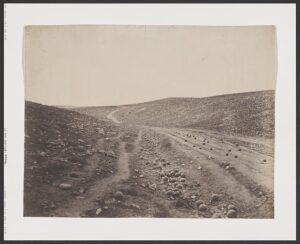by Brock Pate

While American citizens sold weaponry, ships, and supplies to both the allied powers and Russia during the war,[1] this project aims to target those relations that occurred between the Russian Empire and the United States. Norman Saul wrote “American support was most important for morale, contributing to a sense that Russia was not completely alone.” [2] The Crimean War was a time when the relations between the two nations were at an all-time high, in stark contrast to their relations today. This project, while seeking to prove that Americans were in fact involved in the war efforts, will focus on one particular couple: Benjamin W. Perkins[3] and Anna B. Perkins.
During the Crimean War, Russian agents contacted Benjamin Perkins to provide munitions. When he did, he was met with a breach of treaty. Once Perkins understood what had occurred, he initiated a lawsuit against Russia. Apart from the excellent article by Lee A. Farrow, the story of the Perkins’ claim has to this point received little to no thorough treatment.[4] It is a tale of distrust and confusion. To begin, it must be stated that not much is known about Benjamin Perkins. Benjamin and Anna Perkins lived in Worcester, Massachusetts, although most of his dealings took place in New York. From his lawsuit we know that he was a “master mariner” who had climbed the ranks of his post. His suit states that he was “A man who had never owned a barrel of powder or a gun for sale in his life.”[5] Even less is known about his wife Anna.
Benjamin Perkins’ claim that agents of Russia approached him in 1855 for munitions deals marks the beginning of the story. The first deal was for one hundred and fifty-four tons of black powder and the second deal was thirty-five thousand rifles. Right away those numbers seem ludicrous. It is difficult to fathom that a man who had no previous history in arms dealing could be persuaded to, much less, fill an order for such a quantity. Perkins claims he did in fact fill both orders, only to find Russia had decided to not hold up their agreement. The most important part of this story, and the reason the claim never succeeds, is that Perkins never agreed to a written contract with his agents. Everything he did was agreed upon in an oral fashion. According to William H. Seward, the secretary of state who advocated the Perkins claims after the war, a verbal contract held the same weight in the United States as a written contract.[6] Even through this interpretation of U.S. law, ultimately no court found enough weight to ever truly battle Russia in court.
This lawsuit is important to understanding the relations between the two countries because if its merits prove true, which they very well might, it means Russia chose to work with American profiteers. Perkins was not the only person on record to be duped into great losses. A much more high-profile man by the name of Samuel Colt was also allegedly misled by Russian agents.[7] These actions may have even led to the eventual deterioration of trust between the two nations.
Outside of Benjamin W. Perkins, the relations between the U. S. and Russia were displayed by the many trade deals that took place. The U.S. built a ship for Russia named the USS America for the river Amur. [8] Around thirty doctors were sent from the U.S. to hold positions in Russia during the war. Shortly after, the Delafield commission went to Crimea to observe and report the war and military strategies implemented by the Russians.[9] As one scholar points out, the relationship between Russia and the U.S. seemed friendly from the outside, but it was more self-serving (on both sides), profit chasing, and built around an overall distrust of England.[10] The distrust of England happened to land the U.S. in a position that may have favored Russia during the conflict, but the profiteering nature of the U.S. did not stop American agents from double dealing.
Notes
[1] Eufrosina Dvoichenko-Markov, “Americans in the Crimean War,” Russian Review 13, no. 2 (April 1954): pp. 137-145, https://doi.org/10.2307/125706.
[2] Norman E. Saul, Distant Friends: The United States and Russia: 1763-1867 (Lawrence, KS: University Press of Kansas, 1991).
[3] Birth date unknown, death 1862.
[4] See Lee A. Farrow, “A Reexamination of the Perkins Claim,” in New Perspectives in Russian-American Relations, vol. 1 (New York, NY: Routledge, 2016), pp. 74-87.
[5] William Maxwell Evarts, In the Matter of Benjamin W. Perkins Against the Russian Government (Washington, DC, 1860), 42
[6] William H. Seward (1801-1872) served as governor of the state of New York 1838-42, member of the United States Senate 1849-68, secretary of state under President Lincoln, 1861-69, and negotiated the Alaska purchase in 1867.
[7] Norman E. Saul, Distant Friends: The United States and Russia: 1763-1867 (Lawrence, KS: University Press of Kansas, 1991), 252-254.
[8] Eufrosina Dvoichenko-Markov, “Americans in the Crimean War,” Russian Review 13, no. 2 (April 1954): pp. 137-145, https://doi.org/10.2307/125706.
[9] Ibid
[10] Frank A. Golder, “Russian-American Relations During the Crimean War,” The American Historical Review 31, no. 3 (April 1926): pp. 462-476, https://doi.org/10.2307/1840986.